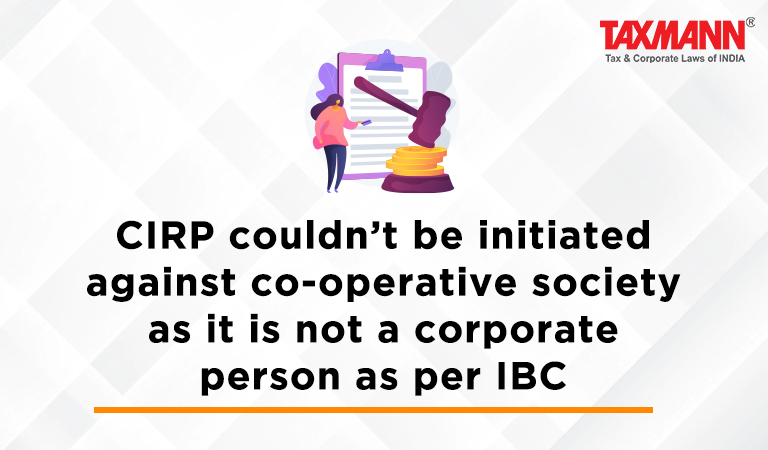CIRP couldn’t be initiated against co-operative society as it is not a corporate person as per IBC
- Blog|News|Insolvency and Bankruptcy Code|
- 2 Min Read
- By Taxmann
- |
- Last Updated on 30 April, 2022

Case Details: Maharashtra State Co-operative Bank Ltd. v. Shri Siddheshwar Sahakari Sakhar Karkhana Ltd. - [2022] 137 taxmann.com 264 (NCLT – Mumbai)
Judiciary and Counsel Details
-
- Rajesh Sharma, Technical Member and Mrs. Suchitra Kanuparthi, Judicial Member
- Omkar Deosthale, Adv. for the Petitioner.
- Rupesh Bobade and Shraddhanand Bhutada Advs. for the Respondent.
Facts of the Case
In the instant case, the appellant – financial creditor had sanctioned a short-term loan to the corporate debtor by way of mortgage with interest and a working capital loan by way of pledge with interest. The repayment of the loan was required to be made by the corporate debtor along with applicable interest. However, the corporate debtor fails to make the repayment of the loan together with applicable interest. Thereafter, the financial creditor filed an application against corporate debtor under section 7 of the IBC claiming that the corporate debtor defaulted in the payment of an amount.
In response to this, the corporate debtor claimed that it was a Co-operative Society registered under Multi-State Co-operative Societies Act, 2002 and hence no CIRP could be initiated against the corporate debtor in terms of section 2 of the IBC. Further, the corporate debtor claimed that the Multi-State Co-operative Societies Act, 2002 is a special statute that itself covers the specific provisions for the winding up of societies registered under the same.
NCLT Held
The NCLT held that the provisions of section 2 and section 3(7) of IBC are to be taken into consideration. Firstly, the corporate debtor is itself a Co-operative Society and hence cannot come under the provisions of section 2(d) as CG has not issued any notification w.r. t the applicability of the Code to the Co-operative Society and hence the applicability of section 3(7) of the Code does not arise.
Secondly, the provisions of the Code are not applicable to the Co-operative Society as the corporate debtor in the matter is registered/incorporated under Multi-State Co-operative Societies Act, 2002 which is a special statute itself.
Thus, it is well settled that the IBC itself is a separate and independent statute which cannot be overruled by any other law as explained under section 238 of the Code. Therefore, it is viewed that the corporate debtor who is a Co-operative Society registered/incorporated under the Multi-State Co-operative Societies Act, 2002, does not come under the purview of the Code and hence the CIRP cannot be initiated against the corporate debtor.
Case Review
-
- Asset Reconstruction Co. (India) Ltd. v. Mohammadiya Educational Society [2021] 132 taxmann.com 37/168 SCL 802 (NCLT – New Delhi) (para 20) followed.
List of Cases Referred to
-
- Basawaraj v. Special Land Acquisition Officer [2013] 14 SCC 81 (para 6)
- Duncan Industries Ltd. v. A.J. Agrochem [2019] 110 taxmann.com 131/156 SCL 478 (SC) (para 6)
- Asset Reconstruction Co. (India) Ltd. v. Mohammadiya Educational Society [2021] 132 taxmann.com 37/168 SCL 802 (NCLAT – New Delhi) (para 14)
- Hindustan Construction Co. v. Union of India [2019] 111 taxmann.com 468/[2020] 158 SCL 7 (SC) (para 18).
Disclaimer: The content/information published on the website is only for general information of the user and shall not be construed as legal advice. While the Taxmann has exercised reasonable efforts to ensure the veracity of information/content published, Taxmann shall be under no liability in any manner whatsoever for incorrect information, if any.

Taxmann Publications has a dedicated in-house Research & Editorial Team. This team consists of a team of Chartered Accountants, Company Secretaries, and Lawyers. This team works under the guidance and supervision of editor-in-chief Mr Rakesh Bhargava.
The Research and Editorial Team is responsible for developing reliable and accurate content for the readers. The team follows the six-sigma approach to achieve the benchmark of zero error in its publications and research platforms. The team ensures that the following publication guidelines are thoroughly followed while developing the content:
- The statutory material is obtained only from the authorized and reliable sources
- All the latest developments in the judicial and legislative fields are covered
- Prepare the analytical write-ups on current, controversial, and important issues to help the readers to understand the concept and its implications
- Every content published by Taxmann is complete, accurate and lucid
- All evidence-based statements are supported with proper reference to Section, Circular No., Notification No. or citations
- The golden rules of grammar, style and consistency are thoroughly followed
- Font and size that’s easy to read and remain consistent across all imprint and digital publications are applied



 CA | CS | CMA
CA | CS | CMA
